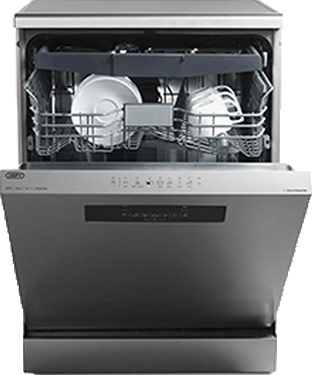 A dishwasher is a time-saving appliance that keeps your kitchen running smoothly. However, to ensure it operates efficiently and lasts for years, regular cleaning and maintenance are essential. Over time, food particles, grease, and mineral buildup can reduce performance, leading to cloudy dishes, unpleasant odors, and even costly repairs. Follow these simple steps to keep your dishwasher in top shape.
A dishwasher is a time-saving appliance that keeps your kitchen running smoothly. However, to ensure it operates efficiently and lasts for years, regular cleaning and maintenance are essential. Over time, food particles, grease, and mineral buildup can reduce performance, leading to cloudy dishes, unpleasant odors, and even costly repairs. Follow these simple steps to keep your dishwasher in top shape.1. Clean the Filter Regularly
Most dishwashers have a removable filter located at the bottom of the unit. This filter catches food debris to prevent clogging the drain.
How to Clean the Filter:
- Remove the bottom rack to access the filter.
- Twist or lift the filter out, depending on your dishwasher model.
- Rinse it under warm water and use a soft brush or sponge with mild detergent to scrub away grease and food particles.
- Reinstall the filter properly before running the dishwasher again.
How often? Every 1-2 weeks, depending on usage.
2. Check and Clean the Spray Arms
The spray arms distribute water throughout the dishwasher, ensuring dishes are cleaned properly. If the holes get clogged with food or mineral deposits, cleaning performance will suffer.
How to Clean the Spray Arms:
- Remove the spray arms if they are detachable.
- Use a toothpick or a small brush to clear debris from the holes.
- Rinse thoroughly under running water.
- Reattach the spray arms securely.
How often? Once a month.
3. Run a Vinegar Wash for Deep Cleaning
Vinegar helps break down grease, food residue, and hard water buildup inside the dishwasher.
How to Do a Vinegar Wash:
- Place a cup of white vinegar in a dishwasher-safe container on the top rack.
- Run a hot water cycle (without dishes) to allow the vinegar to clean the interior.
How often? Once a month.
4. Use the Right Detergent and Rinse Aid
Using the wrong detergent or skipping rinse aid can cause cloudy dishes and residue buildup.
Tips:
- Use high-quality dishwasher detergent designed for your water type (hard or soft).
- Rinse aid helps prevent water spots and improves drying performance.
How often? With every wash.
5. Inspect and Maintain Hoses and Connections
A clogged or leaking hose can lead to poor cleaning results or water damage.
What to Do:
- Check hoses for cracks or blockages.
- Ensure connections are tight and secure.
- Replace hoses if they show signs of wear.
How often? Every 6 months.
Final Thoughts
Regular maintenance not only extends the life of your dishwasher but also ensures it runs efficiently, saving you time and energy. By following these simple cleaning tips, you can prevent breakdowns, reduce costly repairs, and keep your dishes sparkling clean.
Need professional help with your dishwasher? Contact an Absolute Appliance Repairs expert if you notice persistent issues like poor drainage, leaks, or unusual noises.
Keep your dishwasher in top condition, and it will keep your kitchen running smoothly for years to come!